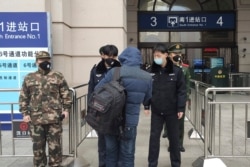Wuhan enjoys a reputation as a transport and manufacturing hub at the confluence of the Han and Yangtze rivers. Often compared to Chicago in the United States, Wuhan is best known today as the center of an outbreak of a deadly coronavirus, the first city locked down by Chinese authorities intent on containing the spreading pneumonia-like illness. Here are comments from Wuhan residents collected by VOA’s Mandarin Service. The names used are those chosen by the speakers.
On making the choice to flee or stay in Wuhan:
On social media, Siwen described fleeing Wuhan as “a night of horror” and expressed anger at the “shameless” authorities who closed down the city at night. Here are some responses to his decision that encapsulate the debate over staying or fleeing.
Many expressed support for Siwen's decision to fly out with his grandmother and in-laws. “Fleeing is right,” said People in Dreams. “No one thinks you are selfish.” The Lone Ranger applauded Siwen, saying “Wuhan will soon face a humanitarian crisis.” Li Ming Tao said “Due to the failure of the government to prevent an epidemic threatening the health of Wuhan, people have the right to flee because they cannot get the right treatment. Even sick people fled. From a human perspective, it is understandable.”
Others took aim at Siwen. “I hope you die fast. Don’t infect others everywhere,” said one. Another asked “You want to contribute to the spread of the epidemic?”
Siwen responded to critics by saying his family passed a strict inspection before leaving the city when it was still open, and is now in self-imposed quarantine in a location he did not name.
On the official decision to lock down Wuhan:
“It is more like a panic-type emergency response,” said an anonymous online commentator. “Crisis response measures and national medical resources have not been effectively introduced.”
Another anonymous online critic posted, “It is hard to imagine the panic, frustration and anger of 10 million Wuhan citizens threatened by the virus.”
Liu, a retired teacher, spoke with VOA in Beijing, saying “This virus is not as powerful as SARS. As long as we pay attention to it and everyone works together. … I don’t think it will have any catastrophic consequences.”
Zhong tweeted “From the … news at the beginning … I thought that the virus had only a limited person-to-person transmission, preventable and controllable, and [now] the panicked closure of the city two weeks later. It is unfair for Wuhan citizens to bear the consequences for the selfishness and incompetence of an authoritarian regime.”
“This is not quite humane because the people there have done nothing wrong,” Lee told VOA in Beijing. “Why are they sealed in?”
Chang said “This country is completely chaotic. Officials are responsible for the top, not the bottom. We are all leeks.” Online, leeks carries the meaning of sacrificial lambs, or people who exist for the benefit of others, especially the government and big corporations.
Ms. Ge, a retiree in Beijing told VOA Wuhan residents are making a “sacrifice. However, only their sacrifice will bring everyone peace and health. … I am grateful to the people of Wuhan for their efforts.”
On Lunar New Year festivities spoiled by the epidemic:
Han, a Uighur college student in Wuhan, posted that she cried when she called to tell her parents in Xinjiang she wasn’t coming home. She opted out of a video call, embarrassed they would “see me cry” at being alone for the new year. “No other students, no friends, no family, no food,” she posted.
Pen Barang, 30, a Cambodian graduate student working on his master’s degree in education curriculum and teaching methodology, is one of at least 19 Cambodian students locked down in Wuhan. He told VOA Khmer of the changes in the city that has been his home for two years.
“When I went to buy groceries to stock up before Wuhan was shut down Thursday, the city was dead quiet,” he said. “Last year I joined the Lunar New Year celebration organized by the school, which was a lot of fun. [This Lunar New Year holiday] it will be impossible for me to go anywhere now this coming week or leave my room at least this weekend. They are already spraying disinfectant on all the student buildings and along the streets. We can only hear that sound [of spraying] and nothing else.”
Sophat Soeung of VOA’s Khmer Service contributed to this report which originated with VOA Mandarin.







